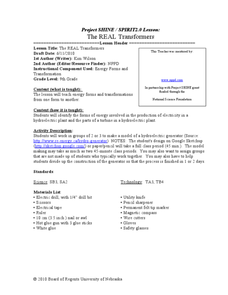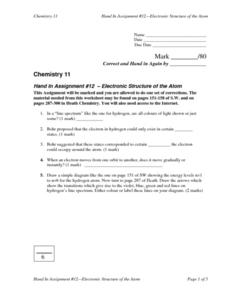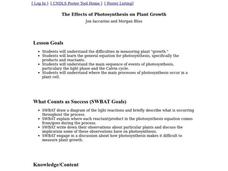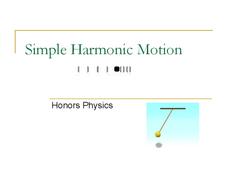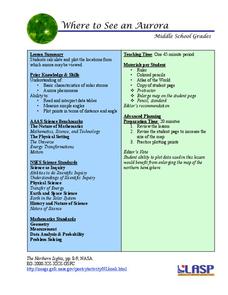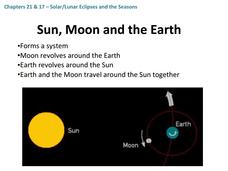Curated OER
Solar Kit Lesson #1 Solar Cell Inquiry
Students use a selection of solar panels, lamps, motors, and an AA battery to get as many motors or lights to operate as they can in an allotted time period. For each successful arrangement, they draw a diagram of their setup, label the...
Curated OER
Magnetism And Electricity
Young scholars investigate the concept of electricity and how to build a circuit. They identify the presence of heat, light, sound, and the magnetic effects. Students construct the circuit and draw a diagram that gives directions for its...
Curated OER
The REAL Transformers
Ninth graders create a model of a hydroelectric generator. In this physics lesson, 9th graders discuss how energy can be transformed from one form to another. They make a flow chart for different energy generating plants.
Curated OER
Electron Structure of the Atom
In this atoms worksheet, students determine the energy difference between levels and draw diagrams of the different types of orbitals. Students determine the ground state electron configuration for given elements. This worksheet has 14...
Curated OER
Let the Sunshine in
Students collect and analyze data to study wavelengths of visible light. They cover Styrofoam cups with three different colors of sun filtering products and shine a lamp directly on the cups. They determine the most effective filtering...
Curated OER
How is heat transferred through conduction?
Fifth graders observe different types of conductors. They answer orally about the conduction of heat energy with 100% accuracy. Students investigate some materials that conduct heat much better than others, and poor conductors can...
Curated OER
Energy Flow in Ecosystems
Students, in groups, create a slide show about the ecosystem and answer critical thinking questions based on their research.
Space Awareness
Climate Zones
The climate at the equator is hotter than the climate at the poles, but why? The lesson goes in depth, explaining how the angles of illumination relate to the heating rate at different latitudes and seasons. Scholars use a strong lamp,...
Columbus City Schools
Making Waves
Learning about waves can have its ups and downs, but a demo-packed tool kit has the class "standing" for more! Learners gain experience with several different wave types, organizing observations and data, and wave...
Urbana School District
Magnetism
The compass was first used in 206 B.C., but we didn't discover magnetic poles until 1263 A.D. Presentation begins with the history of magnetism before continuing on to magnetic fields, magnetic forces, electromagnets, currents,...
Curated OER
The Sun Affects Earth
Third graders read, write, and listen to information about the sun and its effects on the Earth.as it relates to its axis, orbit, rotate, and revolution. In this solar system activity, 3rd graders examine how the sun...
Curated OER
Parts of the Seed
In this biology worksheet, students read about the parts of plant seeds and look at a seed diagram. They read about the roots, endosperm, embryo, and the process of germination. They answer 8 online multiple choice questions based on the...
McGraw Hill
The Bohr Atom
Elements don't have fingers, but they have fingerprints! An interactive simulation gives young scientists the opportunity to study orbital changes of an atom and the corresponding spectrum reading. They realize how each atom has a...
Chicago Botanic Garden
Understanding the Greenhouse Effect
Dive into the power of the sun with a two-part lesson. Budding scientists model the greenhouse effect in a hands-on activity, and then participate in a skit that explores the earth's energy balances and what really occurs in the...
Curated OER
The Effects of Photosynthesis on Plant Growth
Students are able to draw a diagram of the light reactions and briefly describe what is occurring throughout the process. They are able to explain where each reactant/product in the photosynthesis equation comes from/goes during the...
Curated OER
Simple Harmonic Motion
Back and forth, and back again. A presentation on harmonic motion would make a great backdrop for a directed instruction lesson in Honors Physics. It includes diagrams, formulas, graphs, and a few sample problems.
PHET
Where to See an Aurora
Where can you see an aurora in North America? After completing an astronomy activity, scholars can locate the exact coordinates. Pupils plot points of the inner and outer ring of the auroral oval and answer questions based on...
Curated OER
Summary of Organic Reaction Mechanisms Needed for AS Chemistry
Advanced chemistry courses typically cover organic reactions. On this reference sheet, the five types of organic reaction mechanisms are explained and an example is shown. For each, there is also a diagram of the chemical reaction...
Curated OER
Solar/Lunar Eclipses and the Seasons
How do the moon, sun, and Earth line up to create eclipses? Why do the seasons change throughout a year? The answers to these questions are explained through this series of slides. This apt presentation outlines information using bullet...
Curated OER
Reasons for the Seasons
This activity requires the pupils to follow a teacher activity, so more-than-the-usual preparation for a practical is needed. Looking at a globe as it rotates and receives "sunlight" from a flashlight, pupils are able to observe the...
Curated OER
Water Prism
Students using a glass prism filled with water are able to see all of the visible colors found the sunlight.
Curated OER
Growing Corn
Sixth graders create a Venn diagram of different soil types. They plant cord seeds in clay, sand, and fertile black soils are record their growing rates. After two weeks they discuss the effects of soil types on the growth process.
Curated OER
Honors Chemistry I
In this honor chemistry I worksheet, students use all available resources to answer each question given. Students apply their knowledge of light, quantum theory of light, Bohr's model, photoelectric theory.
Curated OER
Open and Closed Circuits
Young scholars distinguish between open and closed circuits. In this open and closed circuits lesson plan, students use their bodies as electric conductors and understand how electricity is a form of energy.




